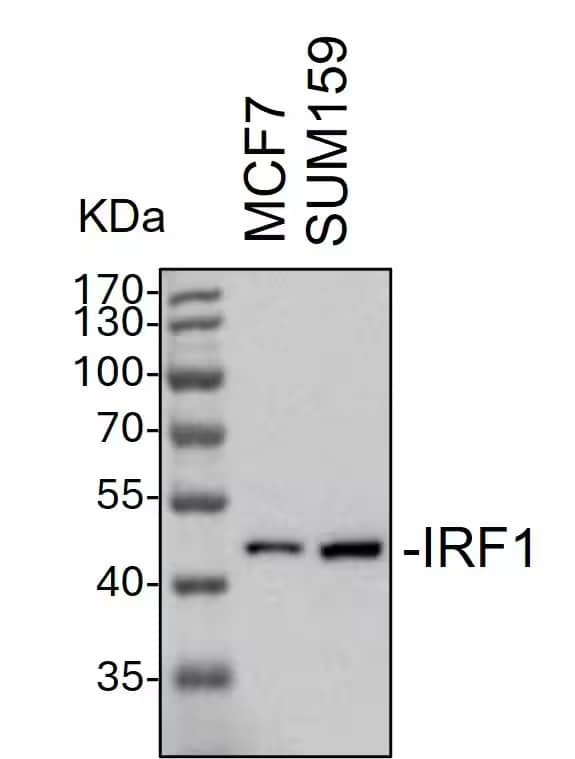Mouse IRF1 Antibody
R&D Systems, part of Bio-Techne | Catalog # AF4715

Key Product Details
Species Reactivity
Validated:
Cited:
Applications
Validated:
Cited:
Label
Antibody Source
Product Specifications
Immunogen
Thr147-Pro329
Accession # P15314
Specificity
Clonality
Host
Isotype
Scientific Data Images for Mouse IRF1 Antibody
Detection of Mouse IRF1 by Western Blot.
Western blot shows lysates of NIH-3T3 mouse embryonic fibroblast cell line. Gels were loaded with 30 µg of whole cell lysate (WCL), 20 µg of cytoplasmic (Cyto), and 10 µg of nuclear extracts (Nuc). PVDF membrane was probed with 1 µg/mL Mouse IRF1 Antigen Affinity-purified Polyclonal Antibody (Catalog # AF4715) followed by HRP-conjugated Anti-Goat IgG Secondary Antibody (Catalog # HAF017). A specific band for IRF1 was detected at approximately 50 kDa (as indicated). This experiment was conducted under reducing conditions and using Immunoblot Buffer Group 1.Detection of Mouse IRF1 antibody by Western Blot.
Whole cell lysates from MCF7 and SUM159 cells were loaded with 50 ug/lane.10% SDS-PAGE. IRF1 Antibody (AF4715) was used for primary antibody: 1:1000, 4℃, overnight. Image from a verified customer review.Applications for Mouse IRF1 Antibody
Western Blot
Sample: NIH-3T3 mouse embryonic fibroblast cell line
Reviewed Applications
Read 2 reviews rated 4.5 using AF4715 in the following applications:
Formulation, Preparation, and Storage
Purification
Reconstitution
Formulation
*Small pack size (-SP) is supplied either lyophilized or as a 0.2 µm filtered solution in PBS.
Shipping
Stability & Storage
- 12 months from date of receipt, -20 to -70 °C as supplied.
- 1 month, 2 to 8 °C under sterile conditions after reconstitution.
- 6 months, -20 to -70 °C under sterile conditions after reconstitution.
Background: IRF1
IRF1 is a member of the interferon regulator transcription factor family, a family characterized by a helix-turn-helix DNA binding domain enriched in tryptophan repeats. IRF family members show diverse cellular regulation of interferon-stimulated gene transcription, viral-mediated gene activation, apoptosis, differentiation, and cellular growth. IRF1 knock out mice show defects in NK and T cell function, as well as, develop CD30+ lymphoproliferative disease.
Long Name
Alternate Names
Gene Symbol
UniProt
Additional IRF1 Products
Product Documents for Mouse IRF1 Antibody
Product Specific Notices for Mouse IRF1 Antibody
For research use only

